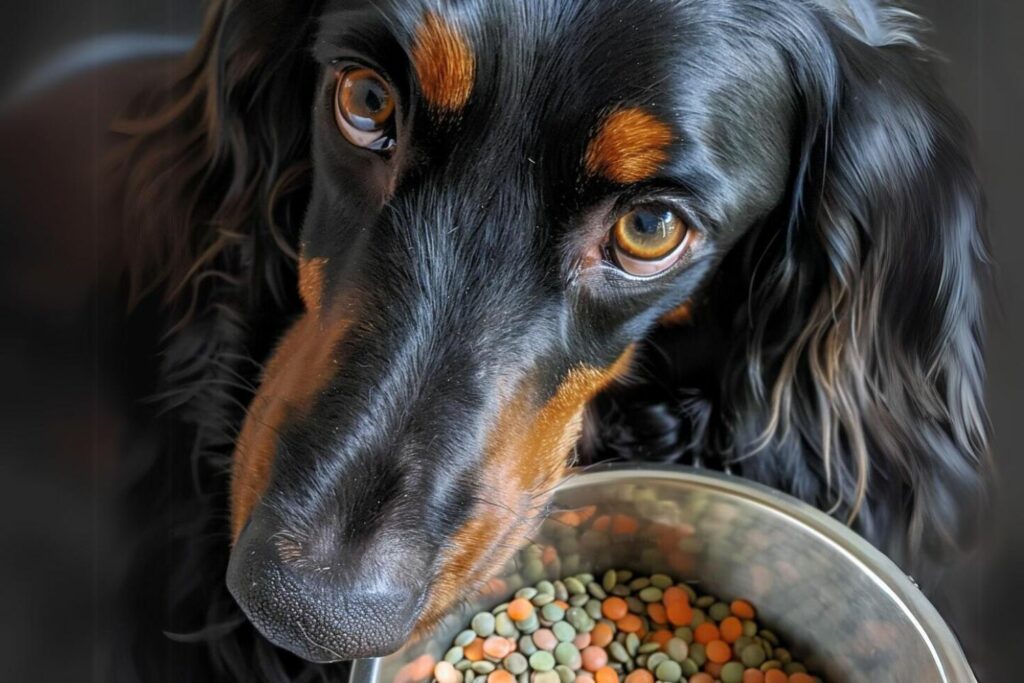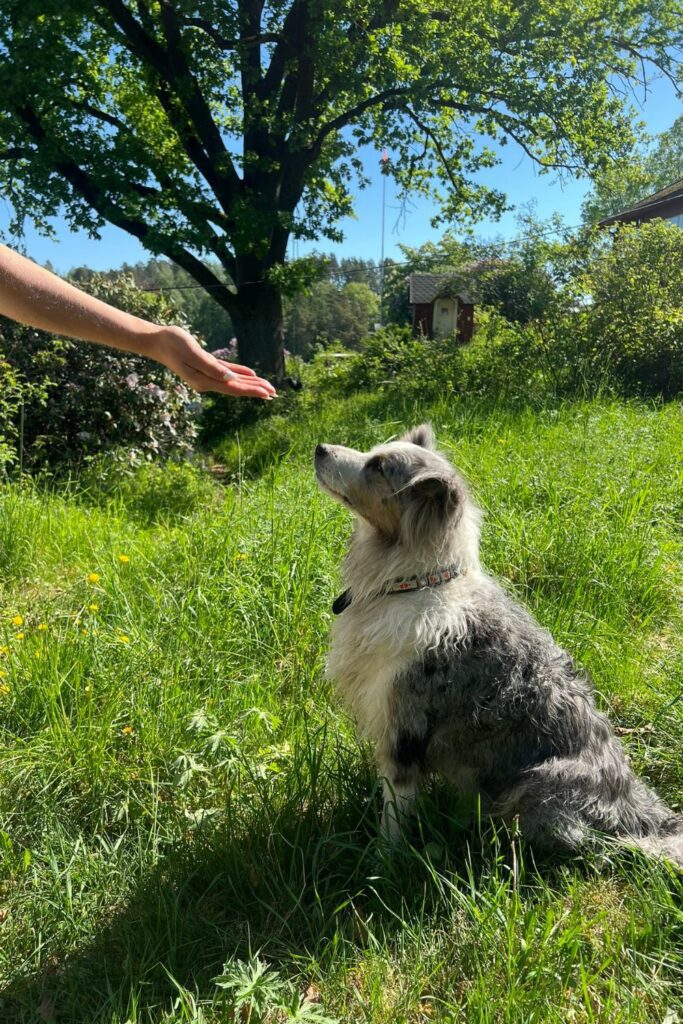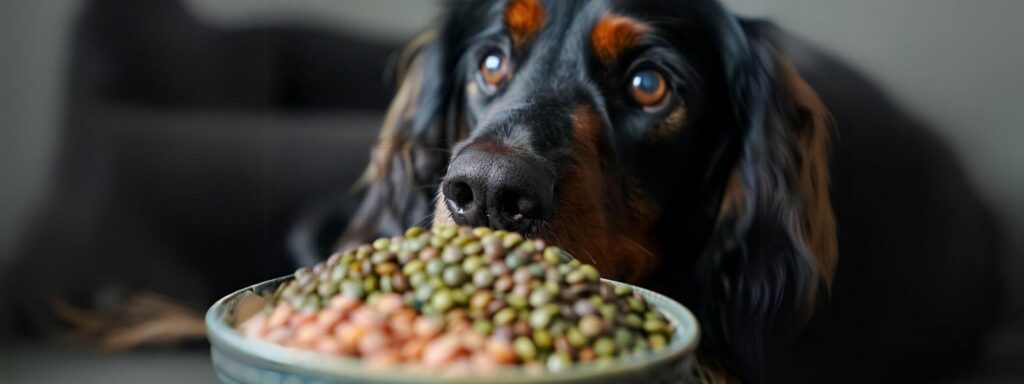Can Dogs Eat Lentils? You Might Be Surprised.
 Cecilie Hemsen Berg
Cecilie Hemsen Berg
When it comes to feeding our canine companions, the wide range of opinions and misinformation can make choosing the right diet daunting. At Nala Health, we believe in taking a scientific approach to dog nutrition, breaking away from restrictive diets that limit food groups based on the general misconception that dogs need to eat like wolves. Instead, we advocate for a balanced inclusion of beneficial ingredients from all food groups, prepared in ways that enhance their health benefits.
It’s not only dogs’ physical appearance that has changed over the years, but research shows that their digestive system has adapted to a varied diet influenced by living together with humans for more than 15 000 years.

Lentils, like other plant-based ingredients, have been unfairly judged due to their association with “anti-nutrients” and DCM. However, when prepared correctly, these same ingredients can offer a wealth of benefits, including essential fibre, vitamins, minerals, fatty acids, and antioxidants that are crucial for maintaining a healthy gut, radiant skin and fur, and overall well-being.
In this article, we’ll explore the scientific truths about lentils in a dog’s diet, explore their nutritional benefits, how they can be safely included, and address common concerns. Join us as we unravel the facts, guided by Nala Health’s commitment to eco-friendly, allergy-friendly, and well-balanced nutrition for our furry friends.
The Nutritional Benefits of Lentils for Dogs
In the quest for balanced and nutritious canine diets, lentils emerge as a superfood, packed with nutrients vital for your dog’s health. But what exactly makes lentils such a beneficial addition to your furry friend’s meal plan? Let’s explore how they contribute to dogs’ overall wellness.
1. Rich in Protein
Lentils are an excellent source of plant protein, and a good choice to add to your dog’s diet. When mixing it with ingredients like sorghum, millet, oats or quinoa to ensure a complete protein*. Protein is essential for building and repairing muscles, bones, skin, fur, blood cells, and producing enzymes and hormones.
2. High in Dietary Fibre
Fibre is crucial in promoting digestive health. It aids in regulating bowel movements and ensuring a healthy gut flora. In addition to being rich in fibre, lentils are gluten-free and have a low glycemic index. They can be particularly beneficial for diabetic dogs and dogs whose digestive systems may not digest grains as effectively; It helps manage blood sugar levels and makes for a nutrient-rich, gluten-free grain alternative.
3. Packed with Essential Vitamins and Minerals
Lentils are a treasure trove of vitamins and minerals, including B vitamins, magnesium, potassium, and iron. B-vitamins, magnesium and potassium are involved with nerve- and muscle function. Iron is crucial for preventing anaemia and keeping your dog’s energy levels up.

4. Antioxidants Abound
Lentils are rich in polyphenols which have antioxidant properties that help combat oxidative stress and inflammation in dogs. This can lead to healthier skin, a shinier coat, and potentially reduced risk of chronic diseases.
5. Low in Fat
Lentils are low in saturated fat, making them ideal for dogs’ weight maintenance. Their low-fat content helps prevent obesity and related health issues, supporting a lean and healthy physique. All legumes contain essential polyunsaturated fatty acids, namely, linoleic and α-linolenic fatty acids.
*Proteins are made up of 22 amino acids. Dogs can synthesise 12 amino acids themselves, but the additional 10 amino acids must be included in their diet to secure a complete protein.
DCM and legumes
Dilated Cardiomyopathy (DCM) is a serious heart condition characterised by an enlarged and weakened heart muscle, which leads to reduced heart function and can result in heart failure. In recent years, a concern among pet owners, veterinarians, and nutritionists sparked a debate over the potential link between legumes and DCM. This concern was significant enough to prompt the Food and Drug Administration (FDA) to launch an investigation.
Despite the initial concerns, the FDA concluded its investigation in 2022, stating that there was “insufficient data to establish causality among DCM case reports and pet food products eaten by afflicted dogs.” This conclusion underscores the complexity of DCM, and there is no definitive relationship between these implicated diet characteristics and DCM.
Rather, DCM can be linked to genetics, taurine deficiency, viral infections, and obesity. In some cases the cause is unknown. Breeds that are more predisposed include Doberman Pinschers, Boxers, Great Danes, Golden Retrievers and Cocker Spaniels.
Taurine is a vital amino acid for heart health but is regarded as non-essential because dogs produce their own taurine. However, it is known that some large dog breeds produce taurine at a slower rate than small dogs, putting them at risk for a deficiency. Since researchers have well-documented taurine deficiency as a potential cause of DCM, choosing dog food with added taurine (like Nala Health) can support heart health.

Preparing Lentils for Optimal Nutritional Benefit
While lentils are undeniably beneficial, preparation is key to releasing their full nutritional potential and ensuring they are safe for your furry friends. This is why it is important to choose dog food that has been prepared properly in order to unlock the benefits of all the ingredients.
Many of the concerns associated with lentils and other legumes centre around anti-nutrients like phytates and lectins, which can interfere with nutrient absorption and digestion of certain minerals. However, proper cooking methods like soaking, sprouting, boiling, or fermenting can significantly reduce or deactivate these compounds. For instance, green lentils, known for their slightly peppery flavour, must be thoroughly boiled to ensure they are digestible and safe for dogs, just like other lentil varieties. Making a hearty lentil soup could be a tasty way of adding some healthy legumes to your dog’s diet, for example as a topper on their food. Though it’s crucial to omit salt, garlic, onions, and other ingredients that are harmful to dogs.
At Nala Health we steam cook our food, a process which makes it easily digestible and unlocks vital nutrients. Our dog food formulations are designed with this holistic view in mind, ensuring that every ingredient, including lentils, contributes positively to your dog’s diet, enhancing health benefits.
Homemade food Incorporating Lentils
When adding lentils to your dog’s diet, balance them with other food groups for complete nutrition. Lentils complement other protein sources and provide fibre, vitamins, minerals, and polyphenols. Expertly formulated dog food is a great way to include these nutritious powerhouses. If making homemade food, ensure recipes are created by an experienced animal nutritionist to avoid malnutrition.
Considerations When Feeding Lentils to Dogs
Lentils can be a nutritious addition to a dog’s diet, offering a myriad of health benefits, and could be used as part of a varied diet. Understanding their potential health benefits and how to address them can ensure that lentils serve their intended purpose: to nourish and support your dog’s health rather than compromise it.
Awareness of Anti-nutrients
Like all legumes, lentils contain anti-nutrients such as lectins and phytates. These compounds can hinder the absorption of certain minerals, and in large quantities, may lead to digestive discomfort. However, the impact of these anti-nutrients is largely mitigated through proper preparation techniques. Soaking, sprouting, boiling, or fermenting lentils before inclusion in your dog’s diet can deactivate these compounds, ensuring the lentils are both safe and nutritious for your pet.
Gradual Dietary Changes
Introducing lentils, or any new food, into your dog’s diet should be done gradually. Abrupt dietary changes can upset a dog’s digestive system, leading to discomfort, gas, or loose stools. If preparing a topper or homemade food, start with small amounts of cooked, properly prepared lentils and observe your dog’s reaction over several days. This cautious approach allows you to monitor for any adverse effects and ensures a smooth dietary transition.

Consultation with a Veterinary Professional
Some dogs may have specific dietary restrictions or health conditions requiring careful diet consideration. Before making significant changes to your dog’s diet, consult with a veterinarian or a canine nutritionist. These professionals can provide personalised advice based on your dog’s health status, breed, age, and activity level, ensuring that any dietary adjustments contribute positively to their overall well-being.
Consideration of Taurine Supplementation
Recent discussions in the veterinary community have highlighted the importance of taurine, an amino acid crucial for heart health, in dogs’ diets. This is especially relevant in the context of preventing heart disease, as taurine plays a key role in supporting cardiac function. While legumes like lentils are valuable for their nutrient content, they do not directly provide taurine. However, including taurine-rich foods or supplements can complement a diet containing lentils, supporting cardiovascular health. Nala Health’s comprehensive approach to canine nutrition includes formulating dog foods with added taurine, addressing the broad spectrum of dietary needs across different breeds, and maintaining heart health.
Understanding DCM and Diet
The conversation around diet and its impact on Dilated Cardiomyopathy (DCM) in dogs has evolved. While researchers have well-documented genetics and taurine deficiency as factors, they continue to study the role of diet. Following the FDA’s statement on the insufficient data to establish causality between DCM and specific diets, Nala Health remains committed to formulating foods that support a broad spectrum of canine health needs, including heart health.
Nala Health’s Commitment to Canine Nutrition
At Nala Health, we focus on ingredient synergy and scientifically balanced diets to support your dog’s overall well-being. Our products promote a strong immune system, healthy joints, cognitive function, radiant skin and fur, and a robust digestive system.
Incorporating lentils, under veterinary guidance, can boost your dog’s health and vitality. Nala Health offers premium, eco-friendly, and allergy-friendly pet food, ensuring top-quality nutrition and care for your furry friend.

FAQs
Can all dogs eat lentils?
Most dogs can eat lentils as part of a balanced diet. However, individual dogs may have specific dietary needs or sensitivities. If you are giving your dog homemade food, it’s important to prepare the lentils correctly and observe your dog’s reaction. A key factor in regards to homemade diets is to collaborate with an animal nutritionist to ensure your dog gets all the necessary nutrients to avoid malnutrition.
Do lentils cause gas in dogs?
If you prepare homemade food for your dog, lentils can cause gas in some dogs, especially if introduced suddenly or fed in large quantities. Start with small amounts and ensure the lentils are cooked properly to help minimise this issue.
Are lentils better than grains for my dog?
Lentils and grains can both be beneficial parts of a dog’s diet, offering a variety of nutritional benefits. The choice between them should be based on your dog’s specific health needs, dietary preferences, and any advice your veterinarian gives.Grains like wheat, barley and rye contain the protein gluten, whereas legumes including lentils are gluten free. Some dogs might be sensitive to gluten
How should I prepare lentils for my dog?
Lentils should be thoroughly cooked without added salt or seasonings. Boiling is the most straightforward preparation method. Soaking the lentils overnight or fermenting them will also enhance their nutritional value. Never feed your dog raw lentils.

Can lentils replace meat in my dog’s diet?
While lentils are a good source of plant-based protein, they should be combined with other protein sources to ensure a complete and balanced diet. Dogs require a range of amino acids that are best supplied through a combination of protein-rich foods like sorghum, peas, millet, oats together with a clean source of meat like edible insects, game, lamb, free-range chicken, white fish, sardines, or eggs. In Nala Health we combine insect protein from black soldier fly with plant protein from peas, sorghum, millet (and oats in our senior food).
What should I do if my dog doesn’t like lentils?
If your dog doesn’t seem interested in lentils, don’t force it. There are other nutritious foods that can provide similar benefits. Always prioritise your dog’s preference and dietary tolerance.
Are canned lentils okay to feed to my dog?
If using canned lentils, choose those without added salt or preservatives. It’s generally better to use dried lentils that you prepare yourself to ensure they’re free from additives.
Conclusion
So, can dogs eat lentils? Yes, they can, and doing so provides nutritional benefits that can support their health in multiple ways. However, understanding the proper preparation and integration of lentils into your pet’s diet is key to unlocking these benefits while minimising potential risks.
By following the guidelines for proper preparation, gradual introduction, ensuring a balanced diet, and consulting veterinary professionals for personalised advice, dog owners can make informed decisions that contribute to the longevity and vitality of their canine companions.
Nala Health’s dedication to producing premium, well-balanced pet food for dogs reflects our commitment to your dog’s health and well-being. Our carefully formulated products are based on science and European guidelines. Our aim is to support a well functioning immune system,healthy joints and bones, cognitive wellness, radiant skin and fur, and a robust digestive system.
Explore our range to discover how we can contribute to your pet’s balanced and nutritious diet.

